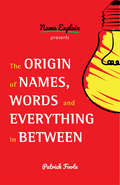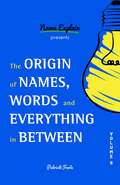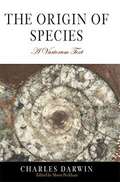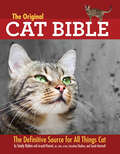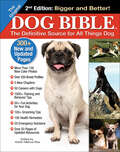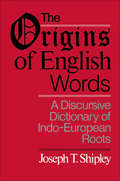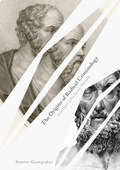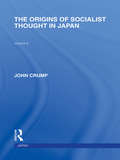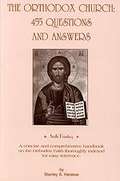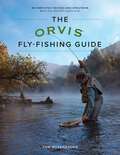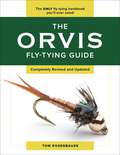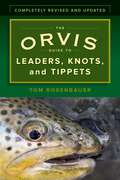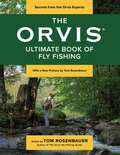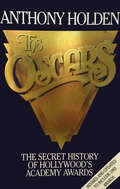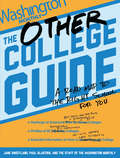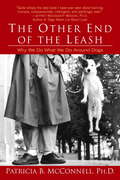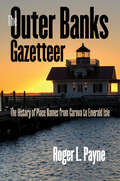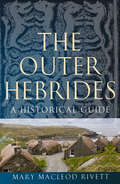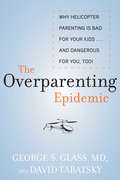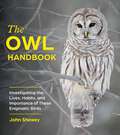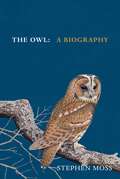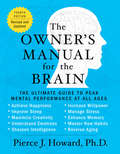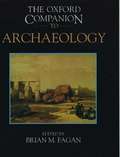- Table View
- List View
The Origin of Names, Words and Everything in Between: (word Origins, Trivia Book For Adults, Funny Trivia, Origin Of Words) (Origin Of Names Ser.)
by Patrick FooteThe bestselling reference that, “from the casually curious to etymology junkies . . . will have something for everyone.” —William C. Fox of the YouTube channel The Exploration with William C. FoxWhat is something that literally everything in existence has in common? It all has a name! With The Origin of Names, Words and Everything in Between, you can learn the origins of these monikers. From countries and cities to toys and animals to even planets, learn the etymology of interesting words in a fun and entertaining way.Learning doesn’t have to be boring. With his fun sense of humor, Patrick Foote—of the YouTube channel Name Explain—explains each appellation with jokes and quips you’re bound to enjoy. Full of pictures and packed with great information, The Origin of Names, Words and Everything in Between does exactly what it says it does—it explains the origin of names in a fun and easy-to-digest way. After reading this book, you will:Know why, exactly, Russia is called RussiaBe able to entertain yourself and your friends with interesting fun factsDiscover the origins of the names of planets, animals, countries, and much more“Patrick has made me realize that even the most mundane and ubiquitous words can have an endlessly fascinating story. His whimsical and friendly tone also makes any topic entertaining and accessible. Hmm . . . now all of a sudden I would love for Patrick to explain ‘mundane,’ ‘ubiquitous’ and ‘whimsical!’” —Betty Chen of the YouTube channel ARTiculations
The Origin of Names, Words and Everything in Between: Volume II (Origin Of Names Ser.)
by Patrick FooteDive into the fun facts behind where names, words, and more come from in this sequel volume to the bestselling etymology compendium.What’s in a name?The answer is far more complex and interesting than you may think. From the person behind the popular YouTube channel, NameExplain, comes the second volume of his bestselling book The Origin of Names, Words and Everything in Between. This new book is a fun, interesting and educational journey through the world of etymology. It covers a huge array of names from a variety of topic areas, and includes a bunch of random facts behind the names. From first names, to bodies of water, there’s no name big or small, important or obscure that won’t be explained.Presented in a light and entertaining manner, The Origin of Names compels you to learn a ton of things you didn’t know you wanted to know. Unlike a dictionary, everything in this book is easy to understand and can be read from start to finish, or in short bursts. It’s also a lot more fun to read? Patrick explains each name with jokes and quips you’re bound to enjoy, and it’s full of pictures too! Be the know-it-all you always wanted to be.In The Origin of Names you’ll:Learn fascinating word origins and bizarre name meaningsBe able to entertain yourself and friends with random factsGain honor and renown for your unrivaled knowledge of etymologyIf you enjoyed books like Interesting Stories For Curious People, Stuff You Should Know, or The Great Book of American Idioms, then you’ll love The Origin of Names, Words and Everything in Between: Volume II.
The Origin of Species: A Variorum Text
by Charles Darwin Morse PeckhamThe theories propounded by Charles Darwin in The Origin of Species have had a profound and revolutionary effect, not only on biology but also on philosophy, history, and theology. His concept of natural selection has created eruptive disputes among scientists and religious leaders of his time and ours. The phenomenal importance of his brilliant work is universally recognized, but the present volume marks the first scholarly attempt to compile a complete variorum edition of The Origin of Species, covering all of the extensive variants in the six texts published between 1859 and 1872. Darwin's changes were extensive. His book grew by a third as he rewrote many passages four or five times, and in this edition Morse Peckham has recorded every one of those changes. A book of such distinctive dimensions, on a subject of such profound importance, will be of intense interest to historians of biology, evolution, science, literature, and cultural development. It will be an invaluable aid to the clarification and full comprehension of this complex and renowned scientific classic.
The Original Cat Bible: The Definitive Source for All Things Cat
by Sandy RobinsThe ultimate comprehensive resource for cat lovers from the editors of Cat Fancy magazine—packed with dazzling photography. The most complete and authoritative book of its kind, The Original Cat Bible delves deeply into all things feline, from the domestication of cats and their anatomy and genetics, to practical advice on pet health, to folklore and fun facts. Learn about: A detailed history of the modern cat (including the noble big cats of the wild)Cat welfare and rescue of stray and feral catsThe feline&’s place in world religions and folkloreCats in literature, art, popular culture through the ages, and social mediaThe development of cat breeds and the genetics of purebred catsBody types, coat types, colors, and patternsA guide to choosing and caring for a pet cat, including advice on catproofing and suppliesExpansive coverage of every recognized cat breed in the world, with contributions from expert guest authors Sarah Hartwell and Lorraine SheltonThorough information on feline health with special veterinary chapters by Dr. Arnold Plotnick
The Original Dog Bible: The Definitive Source for All Things Dog
by Kristin Mehus-RoeThe wooftasticsecond edition. &“This attractive, copiously illustrated easy-to-understand volume covers every aspect of responsible dog ownership.&” —Library Journal The revised and expanded second edition of the bestselling The Original Dog Bible remains the most comprehensive dog lover&’s resource on the market! The book is divided into eight parts—each fully illustrated and designed for easy reference—plus helpful, entertaining sidebars covering hundreds of related topics. With detailed chapters on the requirements of caring for a dog, health, training, and so much more, this book will prepare you for a wonderful life with a dog. Also included is a catalog of over 250 purebred dog breeds with insightful articles for each!&“Being a veteran veterinarian of twenty five years and a lifetime pet lover, I can enthusiastically say &‘this old doc learned new tricks&’ upon reading the consummate book on all things dogs . . . I highly recommend it!&” —Dr. Marty Becker, former resident veterinarian on ABC&’s Good Morning America and coauthor of Chicken Soup for the Dog Lover&’s Soul&“This comprehensive book certainly lives up to its subtitle . . . The best part of the book, however, covers &‘life with a dog,&’ with sections on pet care partners like sitters and walkers, emergencies, lost dogs, biting, traveling with a dog, and a fantastic chapter on activities one can do with one&’s dog.&” —Publishers Weekly
The Origins of English Words: A Discursive Dictionary of Indo-European Roots
by Joseph Twadell ShipleyThere are no direct records of the original Indo-European speech. By comparing the vocabularies of its various descendants, however, it is possible to reconstruct the basic Indo-European roots with considerable confidence. In The Origins of English Words, Shipley catalogues these proposed roots and follows the often devious, always fascinating, process by which some of their offshoots have grown.Anecdotal, eclectic, and always enthusiastic, The Origins of English Words is a diverting expedition beyond linguistics into literature, history, folklore, anthropology, philosophy, and science.
The Origins of Radical Criminology: From Homer to Pre-Socratic Philosophy
by Stratos GeorgoulasThis book critically explores the development of radical criminology through a range of written Ancient Greek works including epic and lyrical poetry, drama and philosophy, across different chapters. It traces the development of political power and the concepts of law, legitimacy, crime, justice and deviance in the Ancient Greek world and the political struggles that propelled that development, using the conflict perspective as a conceptual tool of the sociological analysis of reality. Theoretical discussions of crime and justice typically stem from the better known works of Plato or Aristotle although this book explores the works preceding these. This book will appeal to those interested in the (pre)history of criminology and the historical production of criminological knowledge.
The Origins of Socialist Thought in Japan (Routledge Library Editions: Japan)
by John CrumpSocialism first gained a major foothold in Japan after the revolution and the subsequent Meiji restoration of 1868. Against the background of the rapid development of capitalism in Japan after the revolution, and the accompanying emergence of the working class, this study shows how early Japanese socialists drew on both Western influences and elements from traditional Japanese culture. In the early 1980s most of the world interested in Japan was fascinated by its educational system, industrial policy or low crime rates – things which explained the economic miracle and made it ‘Number One’. John Crump, however, was searching for the origins of socialist thought there. Historians of the socialist movement before and since the 1980s have described the thought of those who figure in the dramas Crump describes. What sets his study apart is the degree to which the theoretical debates discussed matter to him. Other authors often lack sympathy with, or seem frustrated by, the importance given to apparently trivial differences that consumed endless debate. However, at the time he wrote this book, the author was still an activist, even though his activity manifested itself mainly in his scholarship. His aim was to do more than give an account of the formation of socialist thought in Japan. He wanted his readers to think more deeply about the development of capitalism in Japan. This book made an original contribution to the study of Japan in the 1980s. Its unique perspective shines a bright light on debates still relevant today.
The Orthodox Church: 455 Questions and Answers
by Stanley S. HarakasThis is a thorough, easy-to-use reference guide for any member of the Greek Orthodox Church or anyone curious about Orthodoxy. The author (an Orthodox priest), uses everyday language to explain biblical scriptures and how they relate to questions of everyday life. The questions range from biblical translations to current issues concerning marriage, fasting, Icons and Saints, and different church services. Father Harakas also discusses how Orthodoxy is similar to other Christian faiths the traditions and history that has made the Orthodox Church unique throughout history. The Archbishop of the Orthodox Church and the Pope of the Catholic Church have changed since the date of this publication.
The Orvis Fly-Fishing Guide
by Tom RosenbauerNow for the first time in ten years, The Orvis Fly-Fishing Guide appears in a revised edition that solidifies its place as the flagship title of the Orvis brand. A best-selling, fully illustrated, and comprehensive book, this large-format volume has been required reading for every angler for nearly three decades. Included here are instructions for tackle selection; casting and presentation; flies and their specific uses; successful techniques on stream, pond, or ocean; and the select tackle, flies, and methods for pursuing every major gamefish in fresh and salt water, from bass to bonefish, tarpon to trout.
The Orvis Fly-Tying Guide
by Tom RosenbauerThis essential book on fly tying will teach anyone how to tie flies. All the important techniques are illustrated with color photographs, from starting the thread on the hook to whip finishing. The book lays the basic ground work by fully explaining simple tying techniques, and then progresses to detailed tying instructions for some of the most popular, modern patterns. How to choose and prepare the correct material, and all the necessary tying steps for each fly, are detailed in superb, large, color photographs.Even if you have no previous tying experience, you'll be able to tie dries, nymphs, streamers, saltwater offerings, and bass bugs after just a few sessions with this book. The tyer is then advised how to progress to similar patterns using the same basic techniques. Also included is a huge reference of fly patterns - more than four hundred flies from the Orvis catalog are shown in full color, along with the tying recipes and proportions for each one. This book, drawing from the Orvis Company's vast resources and teaching experience and written by an author whose name is synonymous with Orvis, has become the bible for fly-tyers of all skill levels.
The Orvis Guide to Leaders, Knots, and Tippets: A Detailed, Streamside Field Guide To Leader Construction, Fly-Fishing Knots, Tippets and More (Orvis)
by Tom RosenbauerEvery fly fisher knows how crucial leader construction and knot tying are. But with continual changes in line technology, what served as effective leader and tippet connections a decade ago might not be optimal now. By updating the original Orvis Streamside Guide to Leaders, Knots, and Tippets, this handy take-along book addresses the technical issues surrounding leaders and connections in relation to state-of-the-art line materials and types, and details the best overall knots for fly-line connections. Staying connected to the fish just got easier!
The Orvis Quick-Start Guide to Fly-Fishing: Everything You Need to Know to Catch Fish Your First Time Out
by Philip MonahanBuy this book on a Wednesday, and you could be out catching fish on Saturday morning!The Orvis Quick-Start Guide to Fly Fishing is the only book a first-time angler needs to go from zero to catching fish in no time at all. Many people believe that learning to fly-fish is very difficult, but the truth is that, with a little expert instruction, anyone can become a successful fly fisher in a matter of days. Phil Monahan&’s just-the-basics approach will teach you what makes fly-fishing so special, exactly what tackle and gear you need for any given fishing situation, how to cast a fly rod, and fundamental fly-fishing techniques that catch fish. Everything is explained simply, clearly, and concisely without a lot of extraneous information, so you&’ll have the knowledge and skills to go out on the water with confidence. Important topics include: Tackle Selection—Making sure you have the right tools Casting—Including step-by-step photos featuring Orvis instructor Pete Kutzer Fish Biology and Behavior—Understand the species you're targeting Basic Entomology and Fly Selection—How to identify and imitate the bugs trout eat How to Read Water—Learn where fish live in rivers and lakes Fly Presentation—How to put all this knowledge together to catch fish Warmwater Fly Fishing—A whole chapter on how to catch bass and panfish
The Orvis Ultimate Book of Fly Fishing: Secrets from the Orvis Experts
by William G. Tapply Tom Deck Tom Rosenbauer Jim Lepage John Shewey Jack Samson Matthew Supinski Lou TaboryThe OrvisUltimate Book of Fly Fishing is a grand tour of the world of fly-fishing strategies and techniques, from Orvis's world-famous team of experts and advisors. In large format with rich and helpful color photos and drawings, the book covers everything from basic fishing knots and casts to expert techniques you won't see in standard books. Besides trout technique and secrets for rivers and lakes, the book also covers the worlds of fly fishing for bonefish, striped bass, permit, bluefish, largemouth bass, smallmouth bass, and steelhead.Learn how to nymph for steelhead from Matt Supinski. Find out how to catch the elusive permit from Jack Samson. Take a lesson from John Shewey on swinging a classic wet fly for West Coast steelhead. Learn how to find stripers along Northeast beaches from Lou Tabory. Find out which knots work best for saltwater fly fishing. Tom Rosenbauer will tell you how to read a trout stream and approach the fish, then reveals his secrets for catching trout on dry flies and nymphs. Jim Lepage shares his knowledge on catching trout in ponds and lakes, then Bill Tapply will tell you how to catch freshwater bass on flies. Polish your fly casting with world expert Tom Deck. All this and much more in the most comprehensive and attractive book in the Orvis line.
The Oscars
by Anthony HoldenIt is just thirteen inches tall and weighs eight pounds, yet the Oscar has come to exert an hypnotic hold over film performers and audiences alike. This book uses the narrative story of an individual year as the basis of a much broader and historical canvas, to present a portrait of the film world today, and its personalities, finances and power-struggles. It also includes detailed lists of Oscar facts and figures, winners and losers. The author's other books include best-selling biographies of Prince Charles and Laurence Olivier.
The Oscars
by Anthony HoldenIt is just thirteen inches tall and weighs eight pounds, yet the Oscar has come to exert an hypnotic hold over film performers and audiences alike. This book uses the narrative story of an individual year as the basis of a much broader and historical canvas, to present a portrait of the film world today, and its personalities, finances and power-struggles. It also includes detailed lists of Oscar facts and figures, winners and losers. The author's other books include best-selling biographies of Prince Charles and Laurence Olivier.
The Other College Guide
by Jane Sweetland Paul Glastris Staff Washington MonthlyA college degree has never been more important-or more expensive. If you're not made of money, where can you get an amazing liberal arts education without your parents having to remortgage the house or cash in their retirement fund? Which degrees will allow you to fulfill your dreams and earn a decent paycheck? What do you really need to know if you're the first in your family to go to college? How do you find good schools that offer a well-rounded campus life for black or Latino students?From the staff of Washington Monthly comes a new kind of college guide, inspired by and including the magazine's signature alternative college rankings. The Other College Guide features smartly designed, engaging chapters on finding the best-fit schools and the real deal about money, loans, and preparing for the world of work. This essential higher ed handbook also highlights information on what to look for (and watch out for) in online programs and for-profit colleges and concludes with fifty profiles of remarkable but frequently overlooked schools. All things being unequal, The Other College Guide will provide American students-and their families and school counselors-with the honest and practical information they need to make sense of the college process and carve a path to the future they imagine.
The Other End of the Leash: Why We Do What We Do Around Dogs
by Patricia B. McconnellThe Other End of the Leash shares a revolutionary, new perspective on our relationship with dogs, focusing on our behavior in comparison with that of dogs. An applied animal behaviorist and dog trainer with more than twenty years experience, Dr. Patricia McConnell looks at humans as just another interesting species, and muses about why we behave the way we do around our dogs, how dogs might interpret our behavior, and how to interact with our dogs in ways that bring out the best in our four-legged friends. <P><P> After all, although humans and dogs share a remarkable relationship that is unique in the animal world, we are still two entirely different species, each shaped by our individual evolutionary heritage. Quite simply, humans are primates and dogs are canids (like wolves, coyotes, and foxes). Since we each speak a different native tongue, a lot gets lost in the translation.<P> The Other End of the Leash demonstrates how even the slightest changes in your voice and the way you stand can help your dog understand what you want. Once you start to think about your own behavior from the perspective of your dog, you’ll understand why much of what appears to be doggy-disobedience is simply a case of miscommunication. Inside you will learn<P> • How to use your voice so that your dog is more likely to do what you ask.<P> • Why “getting dominance” over your dog is a bad idea.<P> • Why “rough and tumble primate play” can lead to trouble–and how to play with your dog in ways that are fun and keep him out of trouble.<P> • How dogs and humans share personality types–and why most dogs want to live with benevolent leaders rather than “alphawannabees!”<P> In her own insightful, compelling style, Patricia McConnell combines wonderful true stories about people and dogs with a new, accessible scientific perspective on how they should behave around each other. This is a book that strives to help you make the most of life with your dog, and to prevent problems that might arise in that most rewarding of relationships.
The Outer Banks Gazetteer: The History of Place Names from Carova to Emerald Isle
by Roger L. PayneThe rich history of North Carolina's Outer Banks is reflected in the names of its towns, geographic features, and waterways. A book over twenty years in the making, The Outer Banks Gazetteer is a comprehensive reference guide to the region's place names—over 3,000 entries in all. Along the way, Roger L. Payne has cataloged an incredible history of beaches, inlets, towns and communities, islands, rivers, and even sand dunes. There are also many entries for locations that no longer exist—inlets that have disappeared due to erosion or storms, abandoned towns, and Native American villages—which highlight important and nearly forgotten places in North Carolina's history. Going beyond simply recounting the facts behind the names, Payne offers information-packed and entertainingly written stories of North Carolina, its coastal geography, and its people.Perfect for anyone interested in the North Carolina coast, this invaluable reference guide uncovers the history of one of the most-visited areas in the Southeast.
The Outer Hebrides: A Historical Guide
by Mary MacLeod RivettThe Outer Hebrides lie 40 miles to the west of mainland Scotland, forming a barrier to the North Atlantic. Culturally distinct from early prehistory, the islands contain a wealth of historical and archaeological monuments, including the standing stones at Callanish, the magnificent St Clement’s church at Rodel as well as numerous brochs, castles, Pitish houses, croft houses and industrial and military buildings. In addition to descriptions of key historic sites from prehistory onwards and gazetteers covering every place of historical interest, this book also traces the development of the modern environment and landscape of the islands, enabling the visitor to appreciate the sites within their historical and cultural context.
The Overparenting Epidemic: Why Helicopter Parenting Is Bad for Your Kids... and Dangerous for You, Too!
by David Tabatsky M.D. George GlassHelicopter parents, tiger moms, cosseters, hothouse parents . . .Whatever we label it, overparenting--anxious, invasive, overly attentive, and competitive parenting--may have finally backfired. <P><P>As we witness the first generation of overparented children becoming adults in their own right, many studies show that when baby boomer parents intervene inappropriately--with too much advice, excessive favors, and erasing obstacles that kids should negotiate themselves--their "millennial" children end up ill-behaved, anxious, narcissistic, entitled youths unable to cope with everyday life. The obsession with providing everything a child could possibly need, from macrobiotic cupcakes to 24/7 tutors, has created epidemic levels of depression and stress in our country's youth, but this can be avoided if parents would just take a giant step back, check their ambitions at the door, and do what's really best for their kids.Written by a noted psychiatrist and a parenting specialist, The Overparenting Epidemic is a science-based yet humorous and practical book that features an easy-to-read menu of pragmatic, reasonable advice for how to parent children effectively and lovingly without overdoing it, especially in the context of today's demanding world.
The Owl Handbook: Investigating the Lives, Habits, and Importance of These Enigmatic Birds
by John SheweyCharismatic, intriguing, and misunderstood: The Owl Handbook provides a beautifully photographed, thoughtfully researched, and accessible guide to these complex, captivating creatures. Spot an owl that&’s long been watching your every move and darker aspects of its reputation may spring to mind: harbinger of doom, guides through the spirit world, merciless bird of prey. Mythology and superstitions have projected our fear of the unknown onto these mostly night-dwelling creatures. But these wondrous birds are so much more than shadows or silent glides through the night. In The Owl Handbook, lifelong birding enthusiast John Shewey leads us through an exploration of owls&’ cultural impact as seen in folklore and mythology, provides in-depth investigations of 19 owls of North America and a survey of 200 owls across the globe, and gives advice on how to respectfully observe and protect these enigmatic birds, brought to life by hundreds of full-color photographs.
The Owl: A Biography (The Bird Biography Series #5)
by Stephen Moss'BEAUTIFULLY, A BOOK ABOUT BIRDS' The Sunday Times | 'ENGAGING AND EYE-OPENING' The Countryman Uncover the life of owls through this beautiful guide to these secretive and charismatic birds from the bestselling author of The Robin, The Wren, and The Swan.Owls are among the most mysterious birds in the world. Their hauntingly beautiful calls and mostly nocturnal habits have long captured our collective imagination, inspiring more superstitions, folktales, and myths than any other group of birds. Seven species of owl - the tawny, little, barn, long-eared, short-eared, snowy and eagle owl - can be found in the British Isles (out of sixteen different kinds across Europe). They have lived alongside people for thousands of years, yet we still know so little about their day-to-day lives.Discover their fascinating lives, from the moment they first hatch, to the way they hunt their prey and how they raise the next generation. Explore the rich folklore they've inspired around the world and learn how, with a bit of luck, you can catch a glimpse of them yourself.With beautiful illustrations throughout, and expert birdwatching tips, this eye-opening biography reveals the hidden secrets of one of the world's most famous and beloved birds.
The Owner's Manual for the Brain (4th Edition)
by Pierce HowardCutting-edge, user-friendly, and comprehensive: the revolutionary guide to the brain, now fully revised and updatedAt birth each of us is given the most powerful and complex tool of all time: the human brain. And yet, as we well know, it doesn't come with an owner's manual--until now. In this unsurpassed resource, Dr. Pierce J. Howard and his team distill the very latest research and clearly explain the practical, real-world applications to our daily lives. Drawing from the frontiers of psychology, neurobiology, and cognitive science, yet organized and written for maximum usability, The Owner's Manual for the Brain, Fourth Edition, is your comprehensive guide to optimum mental performance and well-being. It should be on every thinking person's bookshelf. What are the ingredients of happiness? Which are the best remedies for headaches and migraines? How can we master creativity, focus, decision making, and willpower? What are the best brain foods? How is it possible to boost memory and intelligence? What is the secret to getting a good night's sleep? How can you positively manage depression, anxiety, addiction, and other disorders? What is the impact of nutrition, stress, and exercise on the brain? Is personality hard-wired or fluid? What are the best strategies when recovering from trauma and loss? How do moods and emotions interact? What is the ideal learning environment for children? How do love, humor, music, friendship, and nature contribute to well-being? Are there ways of reducing negative traits such as aggression, short-temperedness, or irritability? What is the recommended treatment for concussions? Can you delay or prevent Alzheimer's and dementia? What are the most important ingredients to a successful marriage and family? What do the world's most effective managers know about leadership, motivation, and persuasion? Plus 1,000s more topics!
The Oxford Companion to Archaeology
by Brian M. FaganThe Companion is a book of contemporary science with strong roots in the humanities and social sciences, written by active scholars with broad experience in the field and the laboratory. They present the latest advances and discoveries in archaeology.
